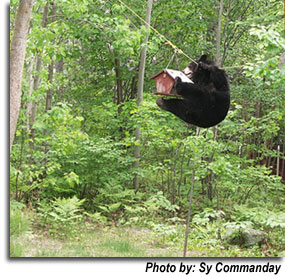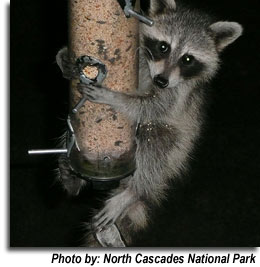When you invite wildlife to your backyard, you may occasionally invite a few undesirables that overstay their welcome. It is important to remember that wildlife do not intentionally try to annoy people, and many times, nuisance animals have been taught their “bad manners” by people.
Feeding wildlife is not illegal in Maryland, unless you are baiting certain game species while hunting (see
Maryland Hunting and Trapping Guide for regulations). Putting out bird feeders rarely causes wildlife conflicts. Bird feeders should be regularly cleaned and maintained to prevent the possible spread of disease as well as to continue enticing your feathery patrons. However, mammals such as bears, deer, raccoons and squirrels may frequent your feeder and cause problems.
Bear-essentials

If you live in a rural area, particularly in western Maryland, then there is a good chance you have a black bear or two as neighbors. Generally, black bears are shy and avoid people. However, black bears are also opportunists and rarely pass up the prospect of a free and easy meal. During the spring and summer, it is best to remove bird feeders of all types. Generally, many birds have sufficient food supply during this time. If you would like to place food out for the birds, then do so away from your home and try to bring feeders and food inside during the evenings. Feeders and suet can be left outside during the winter when bears are hibernating and birds have the fewest food resources. Do not feed bears as they can easily become nuisance animals when they associate people with food.
Deer
Much like bears, it is not advisable to feed deer. Feeding deer, even during the winter, can actually be worse for the deer than having limited natural food resources. One of the problems with feeding deer is due to the makeup of their digestive tract. Deer use beneficial bacterial to digest their food and rapid diet changes can disrupt these bacteria and the deer’s ability to digest its food properly.
To prevent deer from frequenting your bird feeder, take your feeders in at dusk and replace them in the morning. Another option would be to place your feeder up high or placing large-mesh fencing around it to allow birds in but to keep deer out. Spraying deer repellent around your feeder and yard can also provide temporary relief from visiting deer, however, be careful not to use repellants with pepper in them because they can have a negative effect on birds. Flood lights, noisemakers, sprays and/or deer resistant plants can also make a backyard less inviting for a hoofed mammal.
Raccoon raiders

Raccoons, much like bears, are opportunists and are very clever! Raccoons are responsible for most of the human-wildlife conflicts in Maryland and, in 2010, were accountable for over 60% of the rabies cases in the state. Raccoons also won’t pass up a free meal from a bird feeder, so if you see one visiting your feeder then take the feeder down for at least a week. If you want to keep your feeders up, then place them on thin cast iron poles (no greater than 1/2 inch thick). These types of poles are difficult for raccoons to climb, but do make sure the pole is secure in the ground so a rambunctious raccoon doesn’t tip it over. Another alternative would be to hang your feeder on a thin wire strung between two trees. This method will deter raccoons, but squirrels can sometimes walk the wires and access your feeder. Much like bears, feeding raccoons is discouraged, especially given the high percentage of rabies cases from raccoons.
Squirrely ninjas
Squirrels are akin to ninjas as they are cunning and nimble creatures. Squirrels also are very persistent! Squirrels can be quite entertaining to watch and to feed. There are several squirrel feeders available for sale that encourage all sorts of squirrel antics in order for them to grab a meal. However, not everyone appreciates the presence of squirrels. To prevent squirrels from going after your feeder, then place the feeder well away from trees, fences or wires. If you have to hang your feeder on wire between trees, then attach two-foot sections of lightweight 2 to 3 inch diameter plastic pipe. Slit the pipe lengthwise and put it over the wire. It will rotate on the wire, causing the traveling squirrel to fall. Another method is to purchase feeders designed to baffle squirrels. Or mount your feeder on a PVC pipe which is difficult for squirrels to climb. A final method is just to accept squirrels and offer them a low platform with cracked corn. Squirrels often will opt for the easiest food source, and cracked corn is much more desirable to them than bird seed in a feeder.
Other Ways to Reduce Human-Wildlife Conflicts
-
Never leave pet food outside, unattended
- Seal all cracks and crevices that may be used by animals to enter your home. Any size opening can be used by wildlife to enter. If a crack is too small for a mouse or squirrel, it can often be made wider with a little application of rodent teeth! Be sure the animals have left before you seal their exits.
- Screen your chimney and all outside vents in your home. Use ¼” size hardware cloth, not window screens.
- Stack firewood away from your home. Stacked firewood is a favorite hiding place for mice and snakes.
- Fence off small vegetable gardens with chicken wire buried about five inches below ground and extending to about two feet above ground. This will help prevent invasion by rabbits and woodchucks.
- Secure all garbage cans. Do not simply leave a lid on the can. Devise a latch or buy garbage cans with latches - the more difficult to open, the better. Secure your garbage cans to a railing so that they are difficult to tip over.
- Screen all basement window wells so that small animals do not get trapped inside of them. Also, screen off the small spaces that sometimes exist between first floor porches and the ground. Skunks, snakes, groundhogs and other animals find these spaces attractive homes.
- Keep bird feeders and feeding areas clean. If you ever see rats eating left over seeds, then immediately stop putting out bird feed. The birds will adjust; for your sake and for the sake of your neighbors, you need to discourage the rats.
- If a cardinal or other bird is beating itself against one of your windows or a car mirror, you will need to cover the glass so that the bird can no longer see its reflection. This should discourage the offender.
Need More Information? Call 1 (877) 463-6497
There are as many potential wildlife situations that can occur in your backyard or home, as there are species of animals in the world! This sheet is meant to provide very general information to you about preventing wildlife conflicts and its focus is on the typical suburban backyard.
However, these tips can work in any type of area. It is not possible to predict any animal’s behavior, so wildlife conflicts that occur are best handled when they arise. If you find yourself in conflict with one of your wildlife visitors, you should call the Nuisance Wildlife Hotline at 1-877-463-6497.
An operator there will help you with any particular problem which may arise. If they can not immediately help you, then they will let you know whom to contact. The Hotline is available Monday through Friday from 8:00am to 5:00pm.
Don’t let potential wildlife conflicts discourage you from providing wildlife habitat in your backyard. Most wildlife/human conflicts are not dangerous to either party and only need a cool head and some basic information to solve. Use these tips to help avoid potential conflicts and call the experts if you do have a problem. In most cases, you’ll be able to solve the problem yourself!
Invite Wildlife to Your Backyard!
For Additional Information, Contact:
Sarah Witcher
Wildlife and Heritage Service
580 Taylor Ave, E-1
Annapolis, MD 21401
[email protected]
Phone: 410-260-8566
Acknowledgements: